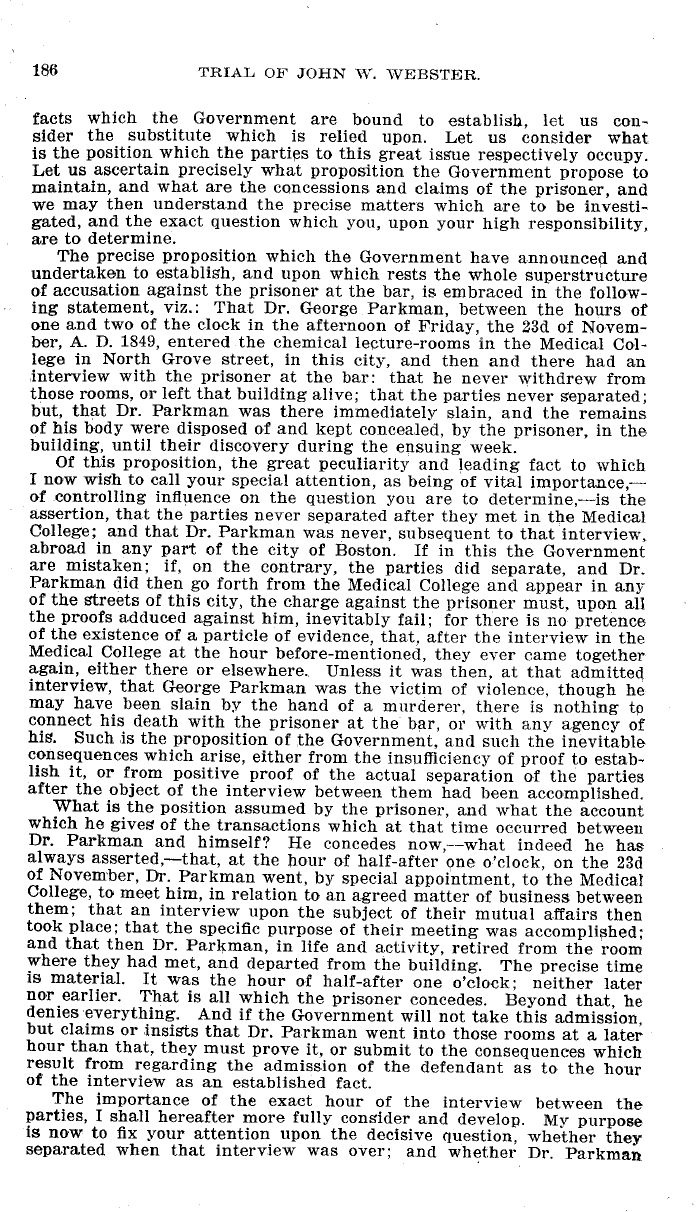|
186 TRIAL OF JOHN W. WEBSTER.
facts which the Government are bound to establish, let us con-
sider the substitute which is relied upon. Let us consider what
is the position which the parties to this great issue respectively occupy.
Let us ascertain precisely what proposition the Government propose to
maintain, and what are the concessions and claims of the prisoner, and
we may then understand the precise matters which are to be investi-
gated, and the exact question which you, upon your high responsibility,
are to determine.
The precise proposition which the Government have announced and
undertaken to establish, and upon which rests the whole superstructure
of accusation against the prisoner at the bar, is embraced in the follow-
ing statement, viz.: That Dr. George Parkman, between the hours of
one and two of the clock in the afternoon of Friday, the 23d of Novem-
ber, A. D. 1849, entered the chemical lecture-rooms in the Medical Col-
lege in North Grove street, in this city, and then and there had an
interview with the prisoner at the bar: that he never withdrew from
those rooms, or left that building alive; that the parties never separated;
but, that Dr. Parkman was there immediately slain, and the remains
of his body were disposed of and kept concealed, by the prisoner, in the
building, until their discovery during the ensuing week.
Of this proposition, the great peculiarity and leading fact to which
I now wish to call your special attention, as being of vital importance,-
of controlling influence on the question you are to determine,-is the
assertion, that the parties never separated after they met in the Medical
College; and that Dr. Parkman was never, subsequent to that interview,
abroad in any part of the city of Boston. If in this the Government
are mistaken; if, on the contrary, the parties did separate, and Dr.
Parkman did then go forth from the Medical College and appear in any
of the streets of this city, the charge against the prisoner must, upon all
the proofs adduced against him, inevitably fail; for there is no pretence
of the existence of a particle of evidence, that, after the interview in the
Medical College at the hour before-mentioned, they ever came together
again, either there or elsewhere. Unless it was then, at that admitted
interview, that George Parkman was the victim of violence, though he
may have been slain by the hand of a murderer, there is nothing to
connect his death with the prisoner at the bar, or with any agency of
his. Such is the proposition of the Government, and such the inevitable
consequences which arise, either from the insufficiency of proof to estab-
lish it, or from positive proof of the actual separation of the parties
after the object of the interview between them had been accomplished.
What is the position assumed by the prisoner, and what the account
which he gives of the transactions which at that time occurred between
Dr. Parkman and himself? He concedes now,--what indeed he has
always asserted,-that, at the hour of half-after one o'clock, on the 23d
of November, Dr. Parkman went, by special appointment, to the Medical
College, to meet him, in relation to an agreed matter of business between
them; that an interview upon the subject of their mutual affairs then
took place; that the specific purpose of their meeting was accomplished;
and that then Dr. Parkman, in life and activity, retired from the room
where they had met, and departed from the building. The precise time
is material. It was the hour of half-after one o'clock; neither later
nor earlier. That is all which the prisoner concedes. Beyond that, he
denies everything. And if the Government will not take this admission,
but claims or insists that Dr. Parkman went into those rooms at a later
hour than that, they must prove it, or submit to the consequences which
result from regarding the admission of the defendant as to the hour
of the interview as an established fact.
The importance of the exact hour of the interview between the
parties, I shall hereafter more fully consider and develop. My purpose
is now to fix your attention upon the decisive question, whether they
separated when that interview was over; and whether Dr. Parkman
|

